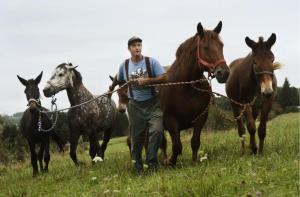By Mary Esch as published in The Valley News
“…horses don’t use fossil fuels, their manure contributes to the farm’s fertility, and they cost less than tractors…”
“Due to the advent of the International Equine Conference and travel the weekly installment of ‘Feel Good Sunday’ fell by the wayside…and I was called on it. So in an effort to bring the planets back into alignment we share with you, today, what should have been shared, yesterday. Please enjoy and it was an emmense pleasure for Terry and I to see and to share quality time with our trusted and valued equine advocate friends. Keep the faith!” ~ R.T. Fitch
Marathon, N.Y. — While most modern farmers work their fields accompanied by the rumble of a trusty tractor, sheep farmer Donn Hewes labors to the faint jingling of harnesses in rhythm with the hoofbeats of horses and mules.
He readily admits that horse-powered farming takes more time and effort than tractor farming. But as one of a growing number of small-scale farmers dedicated to keeping alive the art of the teamster, he’s fine with that.
“People always want to know how many dollars an hour can I make, and can I really profit from farming with horses,” says Hewes. “We can, but to me, that’s the wrong question. I benefit in so many ways. I benefit from working with young stock, building fertility for the farm, and all the time I get to spend enjoying doing what I’m doing.”
Hewes and his wife, Maryrose Livingston, own Northland Sheep Dairy on a hilltop in central New York, 40 miles south of Syracuse. Livingston milks grass-fed sheep and sells handmade cheese. Hewes, who has a night job as a firefighter, works about 100 acres of land with Percheron and Suffolk draft horses and mules pulling implements for haymaking, compost spreading, snow-plowing and log-hauling.
Horse-powered farmers cite a number of reasons for eschewing engines. For example, horses don’t use fossil fuels, their manure contributes to the farm’s fertility, and they cost less than tractors.
As president of Draft Animal Power Network, Hewes is dedicated to mentoring and sharing experiences with other farmers who want to work with horses.
“Young people are starting organic vegetable farms, realizing there’s an opportunity to make healthy food for local markets,” Hewes says. “A segment of that movement is finding out about draft animal power. That’s creating new demand for horse-powered equipment, and Amish businesses are responding to making equipment that’s smaller and more accessible to beginning farmers.”…(CONTINUED)
